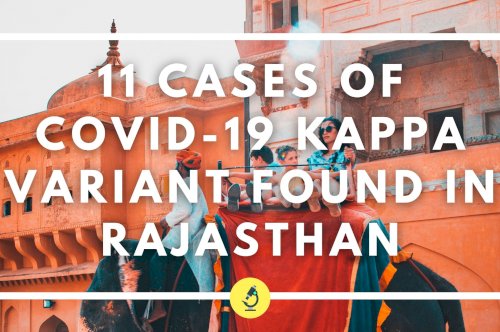New COVID-19 Variant AY.4.2 'Highly Transmissible But Less Fatal' - ICMR

As the Covid-19 infections have re-emerged in several other countries, the new Covid variant AY.4.2 is said to be highly transmissible but may not be fatal, according to ICMR scientist Dr. Samiran Panda. In an interview, Panda noted there is no need to panic but everyone must follow Covid- appropriate behaviour. India is still examining the new variant to determine its effect. "A team is investigating the new Covid-19 variant AY.4.2. ICMR and NCDC teams study and analyse the different variants," said health minister Mansukh Mandaviya on Tuesday.
As per GISAID, seven samples of the delta variant have been discovered in Andhra Pradesh, two in Karnataka, two in Telangana, four in Kerala, one each in Jammu & Kashmir and Maharashtra.
AY.4.2 has raised alarm after the variant was found in increased frequency in the UK but not yet categorised as a 'variant of concern’ — a term used to describe mutations that make the variant more infectious or deadly — by the World Health Organization (WHO). It has been detected in the United Kingdom in the increased frequency.
"The Delta variant sub-lineage AY.4.2, also known as Delta Plus, has aroused concern with its sequence found in ~10% of recent UK cases,” American scientist Eric Topol tweeted on October 24.
Is AY.4.2 variant fatal?
So far, around 17 samples of the SARS-CoV2 variant called AY.4.2 have been identified in the country. AY.4.2 is a sub- lineage of the delta variant of the Covid-causing SARS-CoV-2 virus which continues to be dominant in India.
"The new delta variant seems to be highly transmissible but not fatal, as such. It can be more transmissible (or infectious) considering that the virus does that for its own survival as it needs more hosts (body of human being). However, it is difficult to say that it will be more virulent,” Panda told the online publication.
The head of ICMR’s epidemiology department went on to explain that variants occur as viruses proliferate as offspring do not look exactly like their parents. He said, "Efficient transmission may not necessarily go hand in hand with more virulence because increased virulence will make an infected host less mobile and may even lead to hospitalisation and unfortunate event of death, which is not a smart move as viruses require cells of living hosts to survive as they do not have their own kitchen."
Source - ABP, ICMR




























